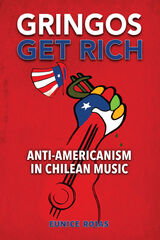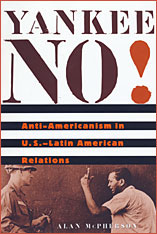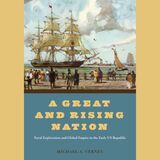
Documents counterimperialism in Chilean music since the 1960s
Gringos Get Rich: Anti-Americanism in Chilean Music examines anti-Americanism in Latin America as manifested in Chilean music in recent history. From a folk-based movement in the 1960s and early 1970s to underground punk rock groups during the Pinochet regime, to socially conscious hip-hop artists of postdictatorship Chile, Chilean music has followed several left-leaning transnational musical trends to grapple with Chile’s fluctuating relationship with the United States. Eunice Rojas’s innovative analysis introduces US readers to a wide swath of Chilean musicians and their powerful protest songs and provides a representative and long view of the negative influences of the United States in Latin America.
Much of the criticism of the United States in Chile’s music centers on the perception of the United States as a heavy-handed source of capitalist imperialism that is exploitative of and threatening to Chile’s poor and working-class public and to Chilean cultural independence and integrity. Rojas incorporates Antonio Gramsci’s theories about the difficulties of struggles for cultural power within elitist capitalist systems to explore anti-Americanism and anti-capitalist music. Ultimately, Rojas shows how the music from various genres, time periods, and political systems attempts to act as a counterhegemonic alternative to Chile’s political, cultural, and economic status quo.
Rojas’s insight is timely with recent political trends toward the right in the Americas. There is also increased interest in and acceptance of popular song lyrics as literary texts. The book will appeal to Latin Americanists, ethnomusicologists, scholars of popular culture and international relations, students, and general readers.
.

In 1958, angry Venezuelans attacked Vice President Richard Nixon in Caracas, opening a turbulent decade in Latin American–U.S. relations. In Yankee No! Alan McPherson sheds much-needed light on the controversial and pressing problem of anti-U.S. sentiment in the world.
Examining the roots of anti-Americanism in Latin America, McPherson focuses on three major crises: the Cuban Revolution, the 1964 Panama riots, and U.S. intervention in the Dominican Republic. Deftly combining cultural and political analysis, he demonstrates the shifting and complex nature of anti-Americanism in each country and the love–hate ambivalence of most Latin Americans toward the United States. When rising panic over “Yankee hating” led Washington to try to contain foreign hostility, the government displayed a surprisingly coherent and consistent response, maintaining an ideological self-confidence that has outlasted a Latin American diplomacy torn between resentment and admiration of the United States.
However, McPherson warns, U.S. leaders run a great risk if they continue to ignore the deeper causes of anti-Americanism. Written with dramatic flair, Yankee No! is a timely, compelling, and carefully researched contribution to international history.
READERS
Browse our collection.
PUBLISHERS
See BiblioVault's publisher services.
STUDENT SERVICES
Files for college accessibility offices.
UChicago Accessibility Resources
home | accessibility | search | about | contact us
BiblioVault ® 2001 - 2024
The University of Chicago Press









